International Leadership Conference Begins
Addressing the Critical Challenges of Our Time: The Role of Government, Civil Society and Faith-Based Organizations
The International Leadership Conference (ILC) convened in Washington, D.C. starting on November 28, 2016, on the theme Addressing the Critical Challenges of Our Time: The Role of Government, Civil Society and Faith-Based Organizations. This international and inter-religious assembly on Capitol Hill is the culmination of all ILCs held worldwide this year, in South Korea, Nepal, Burkina Faso, the United Kingdom, Costa Rica, Paraguay, Zambia, and Japan.
Co-sponsored by the Universal Peace Federation (UPF) and The Washington Times Foundation (TWTF), the ILC is an annual four-day assembly, attended this year by a distinguished group of over 300 leaders from 54 nations including parliamentarians from around the world, members of congress from the United States, elected officials and civic, religious, policy and NGO leaders who actively contribute to the discussion of the most pressing and challenging issues of our time, including that of global conflict, the breakdown of the family, and protection of the environment. With a dialogue emerging from a vast range of political, religious, and national backgrounds, solutions are sought across political and national lines, pursuant to the ILC’s goal to build a growing leadership network that can make a tangible contribution to the prospects for peace in the global community.

About ILC
Over a banquet dinner on the first day of the conference, the welcoming committee consisting of the UPF and TWTF leadership and emceed by Richard de Sena, President of UPF USA, introduced the vision of ILC and expressed the goals and hopes of the conference to forge a new era of principled leadership.
Tom McDevitt, Chairman of The Washington Times and of UPF USA, encouraged networking and the exchange of “ideas that can shape nations, communities, families, characters and people.”
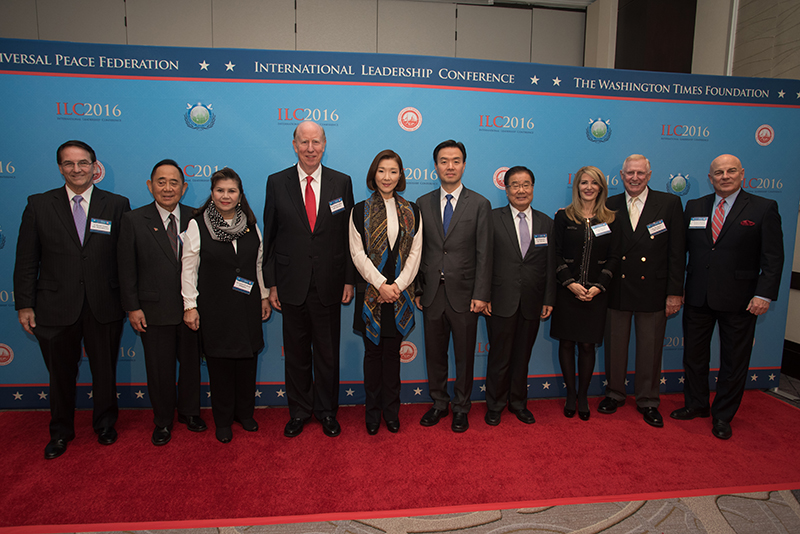
Dr. Ki Hoon Kim, Continental Chairman of FFWPU North America, gave a preview of the next few days, during which the conference will explore critical challenges the world faces today and how to address them. “Our nations are at a turning point in history,” he said, “and the ideals and accumulated experience that you each bring to this gathering could very well set the course for many years ahead.”

Dr. Michael Jenkins, President of TWTF, enumerated the organization’s founding values of freedom, faith, family, service and citizenship, noting particularly the significance of family as the cornerstone of society, the common ground we all share, and the place where love is generated. He added that peace is born from transcending the lines of race, culture, and religion. “How can we turn this corner and make sure this world becomes better and better?” he asked. “It takes every nation to build a better world” and knowing that “resentment will never be destroyed by force, but liberated by forgiveness.”
Dr. Thomas Walsh, President of UPF International, drew the connection between this conference, those that came before it, and the culminating launch of the International Association of Parliamentarians for Peace (IAPP) this week, “drawing together parliamentarians from all political parties and nationalities to form a global network that represents the people and every faith background.” He also invoked the guiding principle of unselfishness as the golden rule to peacebuilding.
Session I: Principles and Best Practices in Leadership and Governance
The first of nine panel sessions covered three key techniques of leadership that are critical in this time in history and generation of leaders. Each of three panel members shared a perspective on best practices in leadership and governance. First, Hon. Dr. Nachman Shai, a senior Knesset member of Israel, outlined the challenges currently faced by Israel, and stressed the importance of leading with vision, courage, and accountability. He began by describing the daily reality of conflict and the rise of terror in the Middle East, and its implications for the need for “strong, determined, and tough leadership.” The only democracy in the Middle East, Israel is revered as a major, stable power in the region, and strives to “speak the language of values, democracy, human rights, and freedom.”
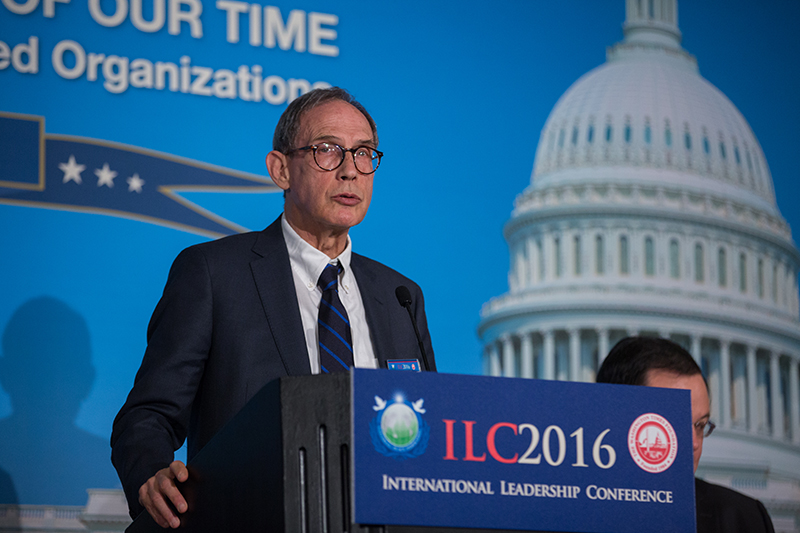
Next, Hon. Michael G. Aguinaldo, Chairman of the Commission on Audit for the Philippines, shared about successful initiatives under way in the Philippines that engage citizens in becoming a part of the nation’s progress and improvement. Put in place by the previous administration in pursuit of institutionalizing open, transparent, accountable, and participatory governance, the Citizen Participatory Audit (CPA) of the Philippines promotes partnership between citizens and government by forming an auditing team that assesses whether public services are being properly delivered. This initiative “brings the process closer to the public so it’s something they can understand and take stock of”, and increases community involvement and ownership.

Hon. Donzella James, State Senator in Georgia, then spoke on leading with courage and integrity, and balancing one’s personal values and identity with being open to new perspectives.
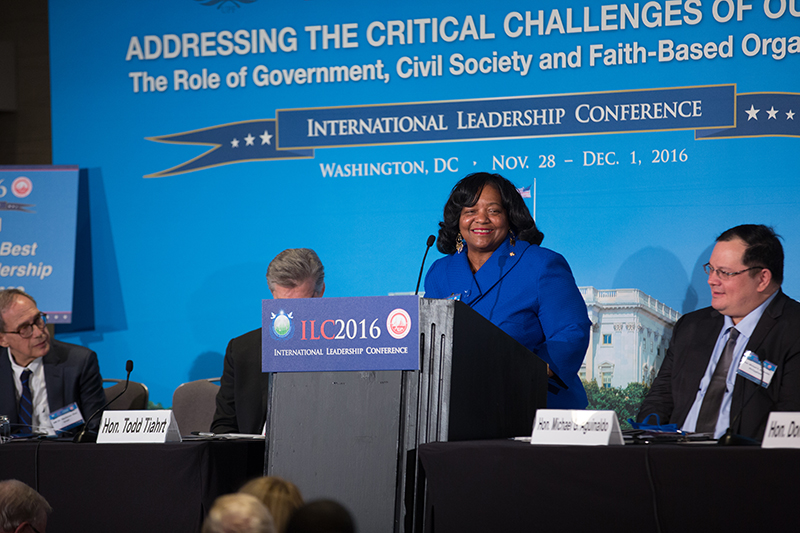
“It can be a slippery slope when you go against your values even just once,” she said. “You don’t become successful in government without a strict sense of personal values. It is the lens with which we view the world, and influences every personal and professional decision we make.” She quoted Dr. Martin Luther King, Jr., who said, “A genuine leader is not a searcher of consensus but a molder of consensus.” She continued, “However, as an elected official, your job is to serve everyone, not just those who agree with you. Ultimately, we cannot get anything done unless we work together and find the common denominator with people who believe differently than we do.”
Upon this preface, conference participants will hear four sessions on Tuesday, November 29, on the freedom of conscience, freedom and responsibility of the press, marriage and family, and solutions to protecting the environment.
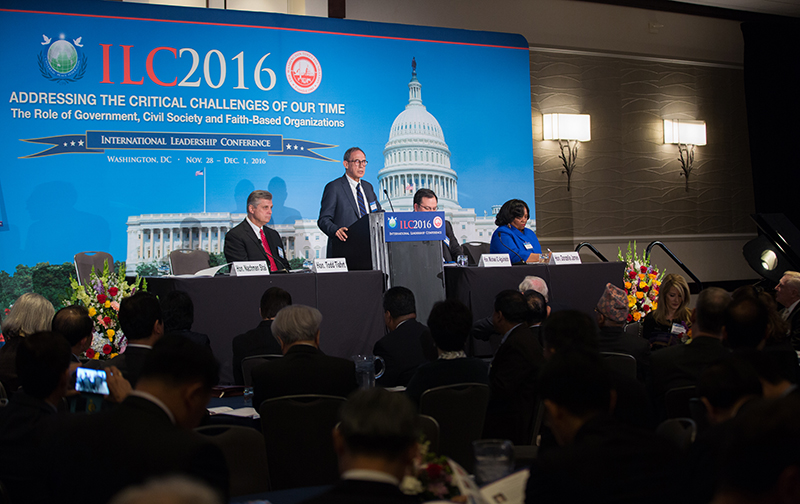
Upcoming ILC Highlights: Presentations, Sunhak Peace Prize, and Parliamentarians for Peace
The conference will continue through December 1 with eight more presentations covering the themes of freedom, family, the environment, media, terrorism, foreign policy, and other sectors of thought leadership. There will also be an award ceremony revealing the recipient of the 2017 Sunhak Peace Prize on November 29, followed by a special session on November 30 to launch a new initiative of parliamentarians working together to create peace and address solutions to the critical challenges of our time.
Stay tuned for daily insights from the International Leadership Conference here on familyfed.org.
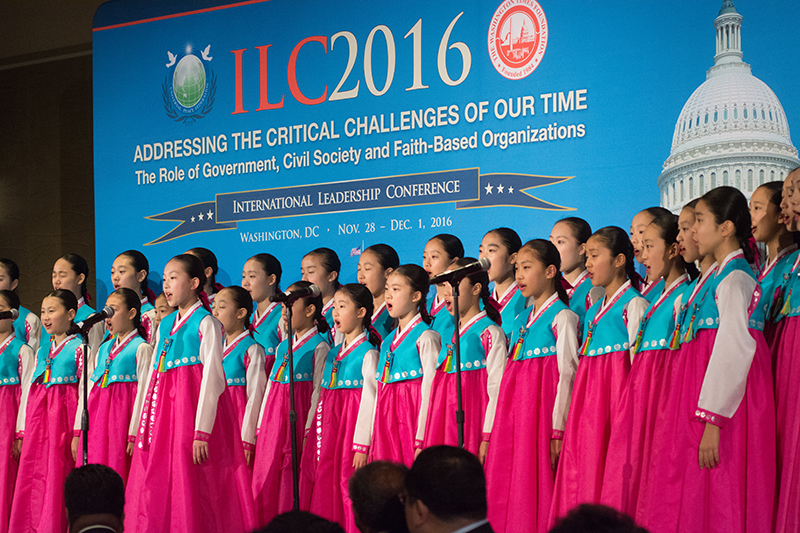
The sponsoring organizations of the International Leadership Conference were founded by True Parents and continue to put their founding vision in motion, a vision rooted in universal spiritual and moral principles that apply to all areas of human endeavor, including the family, society, government, religion, business, academia, media, the arts and sports.
The Washington Times Foundation sponsors thought leadership programs, particularly in the areas of media and journalism, to promote the values of family, freedom, faith, service and citizenship, values that have been weakened and confused in the modern era. The Foundation continues the tradition of media conferences pioneered by the World Media Association.
The Universal Peace Federation and its global network of Ambassadors for Peace apply universal principles to the task of resolving conflict and reconciling the divided human family, and searching for solutions to critical global problems. The World Summit series, the International Leadership Conference series, and a wide range of other programs offer opportunities for global networking and collaboration for the sake of peace and human development. For more information or to get involved in future peace programs by UPF, visit www.us.upf.org.


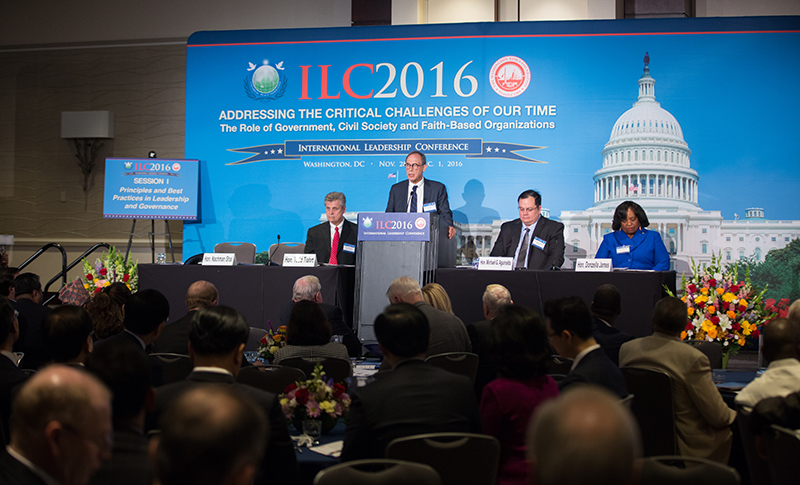

























John Von Dinklage
| #
While we’ve been talking good governance for quite some time now shouldn’t we set real goals to bring all this to the ears of government? Do we really have a plan to do that and make a new start with the incoming government? It’s time to take the message beyond the believers to where it really matters, US government policy making. Our big investments in conferences have to bear fruit, that’s the biggest thank you to the Japanese members who have subsidised these for so long.
Reply
Wayne Hankins
| #
To see so many people of good will come together seeking ways and answers of giving a vision and practical steps of finding ways to unite government, our larger civil society and faith based organisations is so encouraging. The ominous threats that are growing, not lessening are a powerful force to bring people together like the group we see here who can forget the small differences we have and work for something that can change the world for the better is a sign that there is much hope for the future.
Reply
Robert Yee
| #
The inner spiritual conscience base or faith based organizations are the voice, collectively of inalienable human rights or absolute values. The unity of faith based organizations is the first necessary condition towards resolving the current crisis of the confusion of values and consequent break down of modern civil society. The virtues at the heart of building a faith based consensus are interdependence, mutual prosperity, personal responsibility and the respect for the family as the rule of civil society. A careful reading of the Preamble to the US Constitution reveals the universal vision statement of a conscience driven society. In paraphrase, Unity, Justice , Tranquility … to secure the Blessing for ourselves and Posterity.
Reply
Patrick Coakley
| #
Best wishes and my unity of support to all the participants at ILC.
Patrick Coakley
Republic of Ireland
Reply